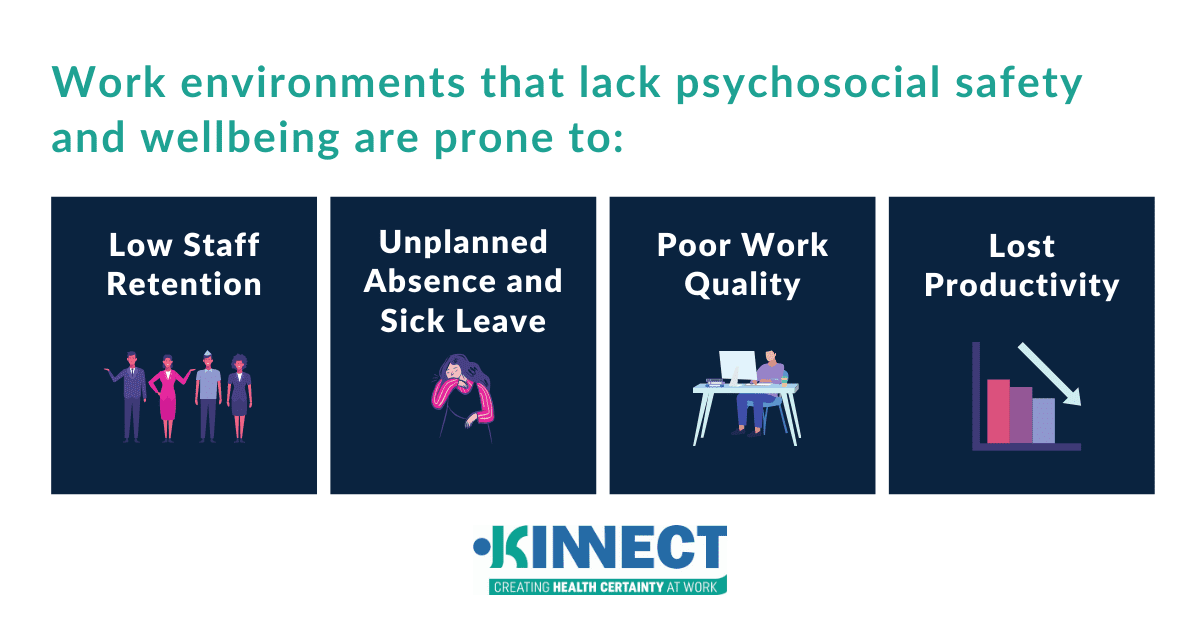The term ‘psychosocially safe work environments’ refers to the mental health and wellbeing in relation to the social environment of a workplace. Recent studies indicate that job-related psychosocial hazards and vocational stress are becoming primary contributors to occupational illness and injury, and workers compensation claims.
Work environments lacking in psychosocial safety and wellness not only affect individual workers’ state of being, but also the success of the organisation. In addition to business prosperity, employers have legal responsibilities under the model WHS Act and health care duties regarding the management of workplace mental and psychosocial risk factors.
Benefits of a Psychosocially Safe Workplace
It makes good business sense to ensure the psychosocial wellbeing of a workplace – for the health and wellness of individual employees and the organisation as a whole. Work environments that lack psychosocial safety and wellbeing are prone to low staff retention rates, unplanned absences and sick leave, presenteeism, poor work quality and lost productivity. Employers that develop and engage strategies for mental and psychosocial health in their workplaces see benefits such as:
- Improved productivity;
- Reduced costs related to absenteeism and high employee turnover;
- Decreased stress levels in individual workers;
- Improved workplace culture and morale;
- Increased worker loyalty and job satisfaction;
- Greater return on training investments;
- Saved time, energy and expenses associated discrimination claims; and
- Elimination or reduction of industrial disputes or fines for breaching Workplace Health and Safety laws.

Factors affecting Psychosocial Health and Wellbeing
There are a number of psychological and social factors that impact the health and wellbeing of an organisation. Firstly, psychological and social support is vital to the individual worker; workplaces should encourage a supportive atmosphere and dialogue about mental health and wellbeing between colleagues and management.
Organisational culture is important in laying the foundations for the health, wellbeing and social structure of a business and its personnel. Companies that work toward improving and generating a positive organisational culture contribute to the psychosocial safe work environment.
Other risk factors that influence the health of a workplace include workloads, work/life balance, respect and courtesy in the workplace, recognition and constructive feedback, protection of psychological and physical safety, and clear expectations and leadership. The absence of psychological support, positive work culture and the aforementioned work-related factors can cause:
- Withdrawal behaviours and mental health issues;
- Conflict in the workplace (including workplace bullying);
- Strain (inducing headaches, fatigue, anxiety and burnouts);
- Incidents, accidents and injuries; and
- Associated costs.
Effectively Managing the Psychosocial Wellness of a Workplace
Under Work Health and Safety (WHS) law, employers are required to identify and establish work practices around potential hazards, risks and actions that may cause incidents in the workplace; this includes events affecting the mental health of current workers and those returning to work. Employers must actively work to eliminate or reduce such hazards and risks.
Workplace systems and policies can be implemented to mitigate these and improve psychological and social health, incorporating the monitoring of work environment conditions and the health (physical and psychological) of employees. Senior management, in particular, is best placed to establish practices and procedures to develop a positive psychosocial culture, which will ultimately impact employees’ work experience.
How KINNECT can help
As Australia’s leading privately-owned and operated Occupational Health and Rehabilitation provider, we understand how critical psychosocially safe and healthy workplaces are to your organisation’s success. We are the custom solution specialists and offer a range of services from pre-employment through to exit, with programs and assessments designed to assist Australian workforces in developing a positive culture and safe psychosocial environment.
All of our standard pre-employment, periodic and exit screening and monitoring medicals include industry-approved psychological and mental health questionnaires and can be customised to your workforce. Additionally, we have designed and developed several online courses in collaboration with our sister company, KINNECT Training, to ensure proactive health outcomes in your workplace:
Resilience in the Workplace Online Course
Discover evidence-based methods to help individuals develop resilience in the workplace and in their personal lives, too. The ability to cope well with pressure, adversity and uncertainty relies on developing a particular set of behaviours, thoughts and actions. Anyone can learn these skills to increase their personal resilience.
Mind Support Online Course
The aim of Mind Support is to help any workplace take action to promote positive mental health and to help those who need support. Mental health is integral to wellbeing and it affects how we feel about our work, our performance and how we interact with others. Taking a proactive approach to emotional health at work is good for the individual and organisation.
Fatigue Management for Supervisors
KINNECT has developed a comprehensive Supervisor Fatigue Management Training Program that provides participants with an understanding of fatigue, the signs and symptoms of, causes and considerations and related consequences.
If you are concerned about the social and psychological health and safety of your workplace, please contact us today to discuss our services and how they can be implemented specifically to ensure the health of your business.
References
Becher, H., & Dollard, M. Psychosocial Safety Climate and Better Productivity in Australian Workplaces. Canberra: Safe Work Australia. (2016). https://www.safeworkaustralia.gov.au/system/files/documents/1705/psychosocial-safety-climate-and-better-productivity-in-australian-workplaces-nov-2016.pdf
Mental health. Safe Work Australia. (2020).
https://www.safeworkaustralia.gov.au/topic/mental-health.
Siegrist J. Psychosocial work environment and health: new evidence. Journal of Epidemiology & Community Health;58:888. (2004).
https://jech.bmj.com/content/58/11/888
2010 Workers with Mental Illness: A Practical Guide for Managers. Australia Human Rights Commission. (2010).
https://humanrights.gov.au/our-work/1-mental-health-workplace#fn2



